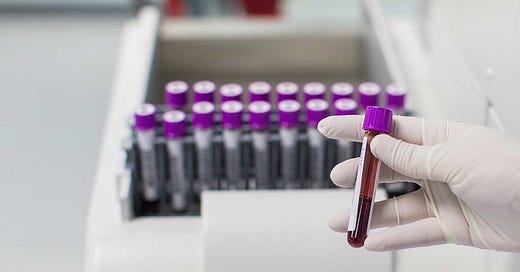Why You Can’t Rely on Symptoms Alone (And What to Do Instead)
After countless requests, I’m finally putting together a full overview on health testing.
This is a longer post, but if you’re looking into testing, unsure what to order, or already dealing with gut issues and trying to figure things out, this should be super helpful.
Quick disclaimer: Nothing in here is medical advice or a replacement for medical advice. This is me sharing my experience, research, and real-world application from working with hundreds of clients. Use it for educational purposes only.
Whether you’re actively trying to fix your digestion, or just want to optimize and maintain your health, testing should be on your radar.
There’s no shortage of overconfidence out there, even with professionals, when it comes to diagnosing health issues without testing.
But here’s the truth: You will never have perfect accuracy assessing your health based only on how you feel alone.
Many people are dealing with issues that have zero symptoms. And when symptoms do show up, like bloating, fatigue, irregular bowel movements, there could be dozens of root causes contributing to it.
It’s usually not just one issue. It’s a stack of them involving numerous contributors.
That’s why just “going off symptoms” many times leads to oversimplified solutions and wasted effort.
This is even more important if you feel fine and just want to stay that way. Sure, tuning into your body helps, but if you want to understand what’s really going on under the hood (your mitochondria, nutrient status, detox function, etc.)… you’re not going to get the full picture without labs.
Most people never run testing. Ever.
And I get it… this used to be me, too.
Not because I didn’t care. There are real obstacles:
Doctors won’t order it: I’ve had dozens of clients tell me their doctors refused to run even basic labs because they “looked fine.”
Access is confusing: Most people don’t know where to run labs or what to order.
It’s not cheap: If doctors refuse (which they often do) this is out of pocket, and tests can run you a few hundred dollars.
Regarding access, this depends on where you are. In the US, Europe, Australia, Canada and many other places, you can order these directly on your own without any doctors.
I use Labify Health in the US for all my testing. I’m not affiliated, but I know the team, trust them and highly recommend working with them if you’re looking for options.
I’m not judging anyone for holding off on testing. But I am going to challenge you to look at the other side of the equation:
What is your health worth to you?
What’s the cost of guessing wrong?
Let’s say you skip testing and try to self-diagnose. You start buying supplements and running protocols… and several months later you’re still stuck and in the same situation, but now you’re also out a few hundred bucks and weeks of your time.
In these situations, the cost of not testing can end up being higher than the test itself.
I’m not here to say you always need labs. For example: if you just got back from vacation, your diet and sleep were garbage, and now your digestion’s off… that’s probably not a mystery.
Clean things up, stay consistent for a few weeks, and you’re likely good.
But if you’ve been dealing with chronic issues for 6+ months, or if you're looking to really dial things in at a high level, skipping testing could mean missing major pieces of the puzzle.
And if you’re someone who claims to care about long-term health but hasn’t even run basic bloodwork for many years, you’re guessing, not optimizing.
I run testing at least once a year, always starting with comprehensive blood work (details below).
But because I travel a lot, change my diet frequently, and do things like walk around barefoot in jungles in South America for months (not a joke)… I go deeper depending on what’s happening.
In certain cases I’ll also run:
Stool testing (especially after travel)
Micronutrient testing
Organic acids (for mitochondrial health + detox systems)
Heavy metals & mycotoxins (every ~2 years)
And of course, if something feels off, or if a test flags something, I dig deeper.
“Okay, but what do I do with the results?” This is the #1 thing I hear. “Even if I get tested, I have no idea what to do about it. What’s the point?”
Fair concern, but most labs now come with at least basic explanations. And many are far more readable than people assume.
Plus, I’ll walk you through the ones I use most, what I look for in them, and what actions they can inform.
So with that, let’s dive in.




